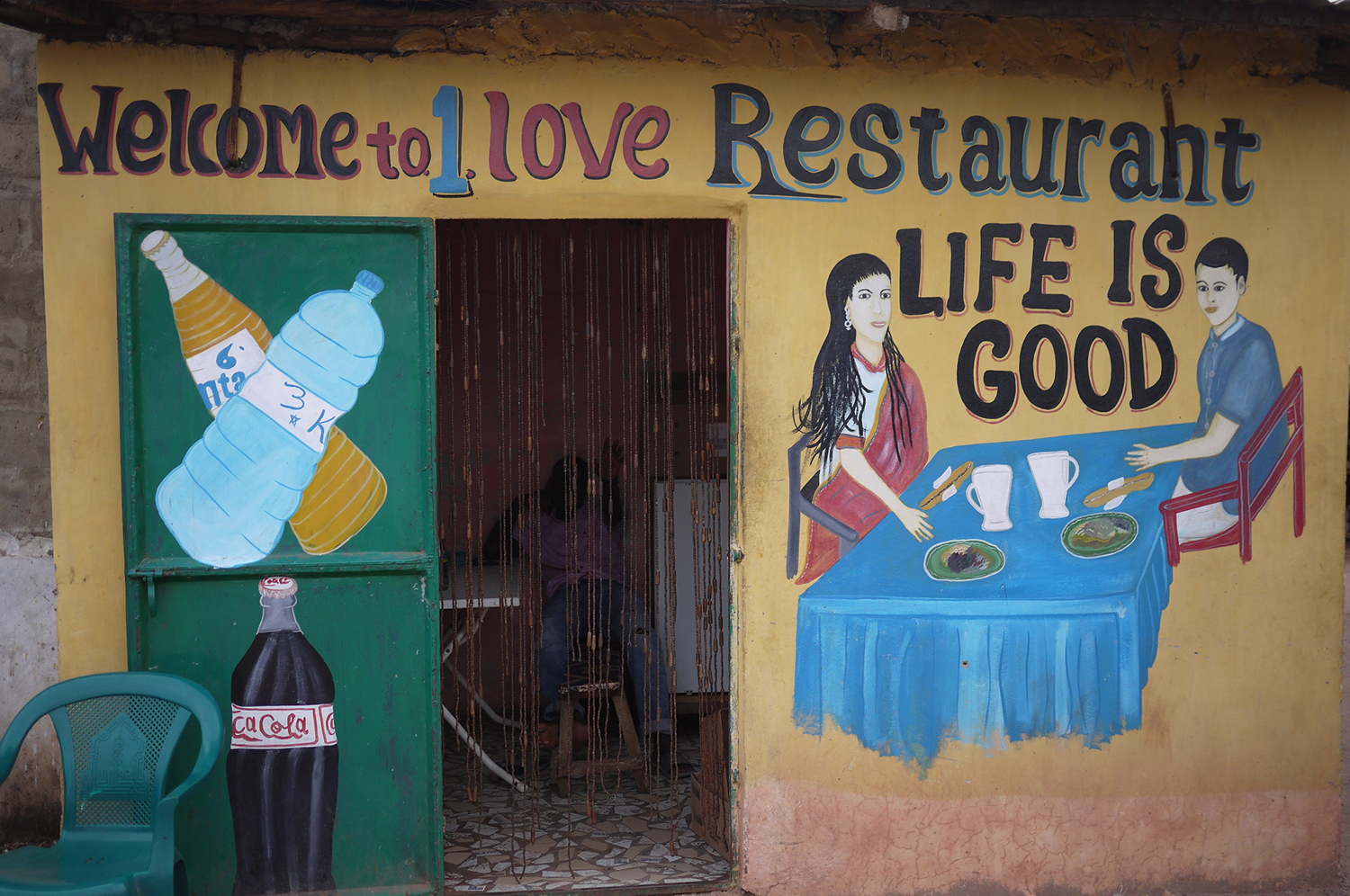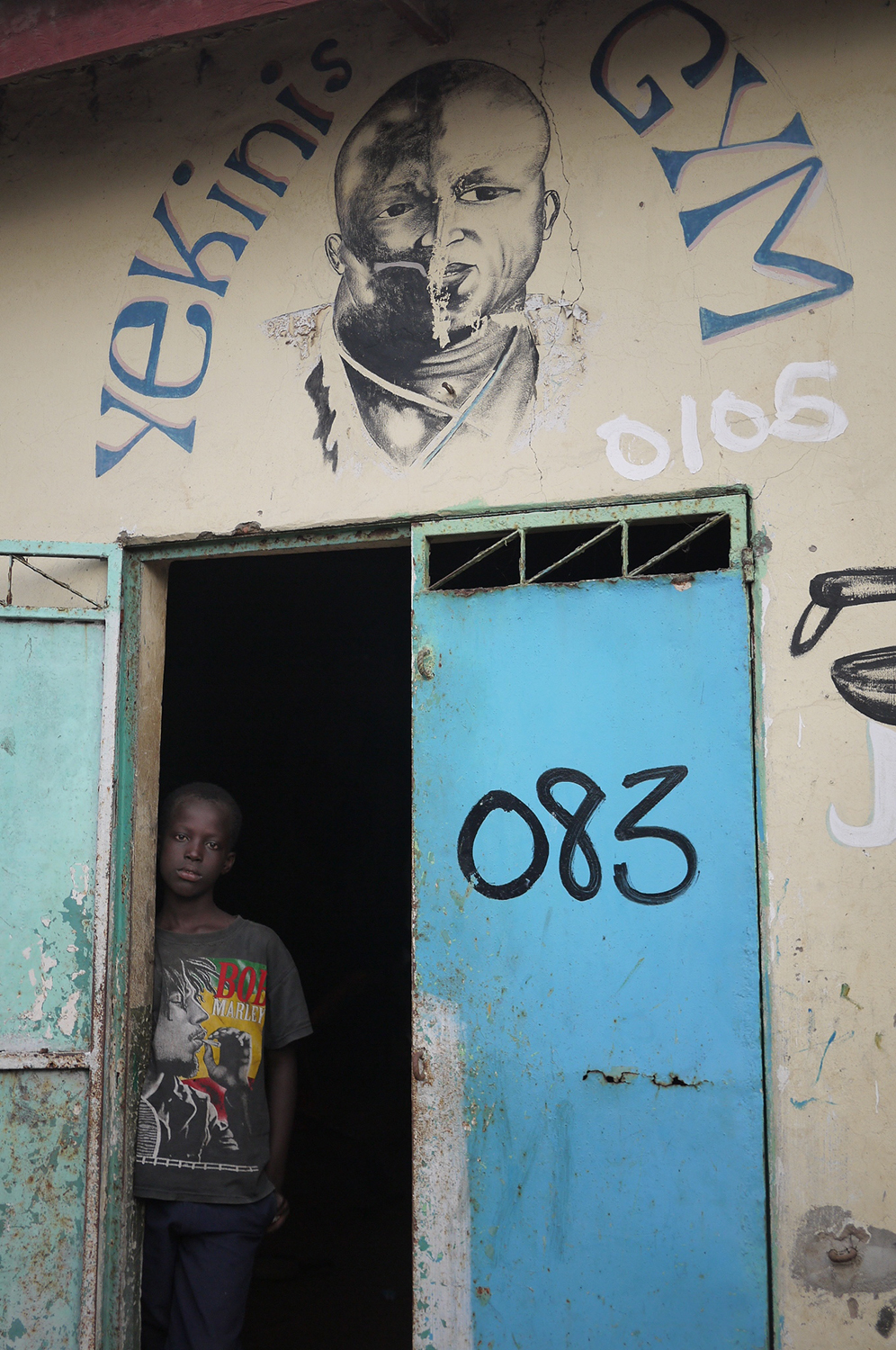1.
 Serrekunda’s beach, the Gambia’s biggest tourist draw, empty again. Two years ago it was fear of Ebola. Now, political crisis, checkpoints, soldiers with AK-47s, bazookas. Alex Sesouy, a tourist guide, had time to talk. Still, he hesitated. “I didn’t believe. And then it happened to me myself.” He’d been down here playing football when some men from Mali came up to ask directions, put out their hands. Sesouy had a bad feeling. “We’re living in a world where you don’t trust no one.” But this was the smiling coast. Gambians shook hands, visited, nothing but time, thousands of young guys here in the capital region, away from home trying to provide, but no work anywhere. Also, Sesouy was polite. So he gave the Malian men directions, shook hands one by one.
Serrekunda’s beach, the Gambia’s biggest tourist draw, empty again. Two years ago it was fear of Ebola. Now, political crisis, checkpoints, soldiers with AK-47s, bazookas. Alex Sesouy, a tourist guide, had time to talk. Still, he hesitated. “I didn’t believe. And then it happened to me myself.” He’d been down here playing football when some men from Mali came up to ask directions, put out their hands. Sesouy had a bad feeling. “We’re living in a world where you don’t trust no one.” But this was the smiling coast. Gambians shook hands, visited, nothing but time, thousands of young guys here in the capital region, away from home trying to provide, but no work anywhere. Also, Sesouy was polite. So he gave the Malian men directions, shook hands one by one.
A few minutes later, he went cold all over—cold, electric—“I felt something coming out of me.” Sesouy looked in his shorts, then screamed. His friends rushed over. “I lost my dick!”
Sesouy knew what had happened: One of the Malians had been a marabout, an Islamic holy man gone bad, using juju for profit, stealing Sesouy’s penis for ransom.
Sesouy held up a fist, thumb slotted between his fingers, just a nub poking through. “It was like this, rus”—a Wolof word for “shrink.” But, wait, that just sounded like swimming in cold water had… Then again, this close to the equator, the water didn’t get cold.
Later, one of the Malian men told Sesouy he could have his penis back, for 300 euros. Sesouy and his friends did go to the marabout, but instead of paying him—Sesouy had no money—they beat him up and dragged him to a police station. “I went into the toilet with the policeman and showed him.” The marabout denied he was a marabout, but the cops beat him anyway, until he confessed and agreed to return the penis. “Then,” Sesouy said, “my cock is calm.” In the end, the Malians were deported.
Sounds scary, I said, also thinking of the cops, the violence on the guy who, maybe, was just asking directions. “What can I do?” Sesouy said, staring at the folded beach chairs, the shuttered snack stands, the stray cattle straggling across the sand. No work anywhere. “If I don’t have my dick,” he said, “I am not a man.”
2.
Penis theft has spread across western and central Africa. Accounts like Sesouy’s have appeared in the press in Nigeria, Ghana, the Central African Republic. But the phenomenon is by no means limited to Africa. And it has a history.
The ancient Chinese Book of Internal Medicine (300 BC) diagnosed “suo-yang” (shrinking manhood)—ghosts stealing the penises of the living to replace their own. Medieval Europe: A passage in the Malleus Maleficarum, a manual for the Inquisition, described how witches “somehow take members in large numbers—twenty or thirty—and shut them up together in a birds’ nest or some box, where they move about like living members, eating oats or other feed.” In the late nineteenth century, psychiatrists studied retracing-penis syndrome among the Dutch. In the 1960s and ’70s, southeast Asia saw up to eighty cases a day of “koro” (Malay for the head of a turtle). Another epidemic, in 1985, claimed 5,000 victims in the Chinese province of Guandong.
The presumed causes, usually but not always supernatural; in Singapore, koro gets ascribed to eating pork. Cures range from the mystical (tie a red thread around it) to the pleasurable (have your wife perform fellatio) to the painful (clamp it in a vise).
Western psychiatrists chalk it all up to neuroticism, castration fear, masturbation. But they don’t dismiss it. Koro appears in the DSM-V, alongside other culture-bound syndromes: the evil eye, Native American ghost sickness, anorexia, bulimia, extreme social embarrassment in Japan. Every society has its own anxieties.
And the Gambia has had its share. For twenty-plus years under former president Yahya Jammeh—who nearly sparked a military confrontation in refusing to step down after losing the last election—the country endured not just economic crisis but rampant corruption, constant intimidation of the political opposition, and among the worst ranked health care and education systems in the world. Belief in witchcraft has risen in this part of Africa, perhaps, the anthropologistJean La Fontaine argues, as “a means of explaining… otherwise inexplicable misfortune.” A whole people, not just bewildered individuals, can feel something has gone missing.
3.

In “Chasing Manhood,” the pilot episode of Banjul Cops, the first Gambian-produced TV drama, detectives Delia Law and Morris Justice are called to a local hospital. A young man lies abed, stunned by his bad fortune. “We have about a dozen cases on my ward,” his doctor says. A flashback shows the patient passing through Banjul’s market, followed by a marabout in long robes who, in eerie slow-motion, grabs him by the shoulder and stares into his eyes. Shaken, the young man goes about his day, then uses the toilet and—“Don’t you see?” the doctor implores the detectives. “It’s the organ snatcher, he’s back!” The marabout has been storing the stolen members in a cigar box, peddling them as “an ancient form of Viagra.” After he’s apprehended, he agrees to restore them to the “genitally challenged.” But not before treating Law and Justice to a glimpse inside the box. The camera prudently cuts away.
Halfway through the episode, our heroes are driving to meet an informant. To Detective Law, the whole endeavor seems absurd. Having just come home to Banjul, she represents the Gambian diaspora, which grew so quickly under Jammeh that this nation of 2 million has been and remains the fourth largest contributor of asylum seekers to Italy. Raised and educated in Europe, Detective Law can’t get her head around the notion that a penis can magically disappear. “I just can’t believe it,” she keeps saying.
Her partner slams on the brakes. On the side of one of Banjul’s dusty roads, Justice tells Law, “You will take ‘I can’t believe’ out of your vocabulary—this is Africa!” He’s both acknowledging her skepticism and asking her to put it aside. This one isn’t going to be solved by mere rational inquiry or shoe-leather police work.
After consulting a shaman, the detectives crack the case by baiting the snatcher, making Justice an easy target, putting his own manhood on the line. By episode’s end, even Detective Law is convinced. The chastened thief promises not to use his gifts for ill—after all, marabouts can both harm and heal, rob and revive, powers indispensable in a country with such poor conventional medical care. Law and Justice get their man, but it’s belief that wins the day.
This dispatch is from #VQRTrueStory, our social-media experiment in nonfiction, which you can follow by visiting us on Instagram: @vqreview.








